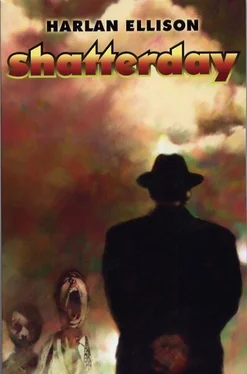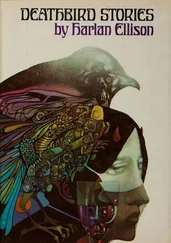He began to cry.
He slumped against the open door and wept, hiding his face in his hands partially because he was ashamed, but more because he was frightened.
She gave the boy a tip, took the box, and edged inside the apartment, moving Kirxby with her, gently. She closed the door, turned on a light, and helped him to the sofa.
When she came back from putting away the groceries, she slipped out of her shoes and sat as far away from him as the length of the sofa would permit. The light was behind her and she could see his swollen, terrified face clearly. His eyes were very bright. There was a trapped expression on his face. For a long time she said nothing.
Finally, when his breathing became regular, she said, “Michael, what the hell is it? Tell me.”
But he could not speak of it. He was too frightened to name it. As long as he kept it to himself, it was just barely possible it was a figment of delusion, a ravening beast of the mind that would vanish as soon as he was able to draw a deep breath. He knew he was lying to himself. It was real. It was happening to him, inexorably.
She kept at him, speaking softly, cajoling him, prising the story from him. And so he told her. Of the reversal of his life. Of the film running backward. Of the river flowing upstream. Carrying him back and back and back into a dark land from which there could never be escape.
“And I ran away. I went to St. Kitts. And I walked into a shop, some dumb shop, just some dumb kind of tourist goods shop…”
“And what was her name… Greta… ?”
“Gretchen.”
“… Gretchen. And Gretchen was there.”
“Yes.”
“Oh, my God, Michael. You’re making yourself crazy. This is lunatic. You’ve got to stop it.”
“Stop it!?! Jesus, I wish I could stop it. But I can’t. Don’t you see, you’re part of it. It’s unstoppable, it’s crazy but it’s hellish. I haven’t slept in days. I’m afraid to go to sleep. God knows what might happen.”
“You’re building all this in your mind, Michael. It isn’t real. Lack of sleep is making you paranoid.”
“No… no… listen… here, listen to this… I remembered it from years ago… I read it… I found it when I went looking for it…” He lurched off the sofa, found the book on the wet bar and brought it back under the light. It was The Plague by Camus, in a Modern Library edition. He thumbed through the book and could not find the place. Then she took it from him and laid it on her palm and it fell open to the page, because he had read and reread the section. She read it aloud, where he had underlined it:
“‘Had he been less tired, his senses more alert, that all-pervading odor of death might have made him sentimental. But when a man has had only four hours’ sleep, he isn’t sentimental. He sees things as they are; that is to say, he sees them in the garish light of justice—hideous, witless justice.’” She closed the book and stared at him. “You really believe this, don’t you?”
“Don’t I? Of course I do! I’d be what you think I am, crazy… not to believe it. Kate, listen to me. Look, here you are. It’s twelve years. Twelve years and another life. But here you are, back with me again, just in sequence. You were my lover before I met Gretchen. I knew it would be you!”
“Michael, don’t let this make you stop thinking. There’s no way you could have known. Bill and I have been divorced for two years. I just moved back to the city last week. Of course I’d look you up. We had a very good thing together. If I hadn’t met Bill we might still be together.”
“Jesus, Kate, you’re not listening to me. I’m trying to tell you this is some kind of terrible justice. I’m rolling back through time with the women I’ve known. There’s you, and if there’s you, then the next one before you was Marcie. And if I go back to her, then that means that after Marcie… after Marcie… before Marcie there was…”
He couldn’t speak the name.
She said the name. His face went white again. It was the speaking of the unspeakable.
“Oh God, Kate, oh dear God, I’m screwed, I’m screwed…”
“Cindy can’t get you, Mike. She’s still in the Home, isn’t she?”
He nodded, unable to answer.
Kate slid across and held him. He was shaking. “It’s all right. It’s going to be all right.”
She tried to rock him, like a child in pain, but his terror was an electric current surging through him. “I’ll take care of you,” she said. “Till you’re better. There won’t be any Marcie, and there certainly won’t be any Cindy.”
“No!” he screamed, pulling away from her. “No!”
He stumbled toward the door. “I’ve got to get out of here. They can find me here. I’ve got to go somewhere out away from here, fast, fast, where they can’t find me ever.”
He yanked open the door and ran into the hall. The elevator was not there. It was never there when he needed it, needed it badly, needed it desperately.
He ran down the stairs and into the vestibule of the building. The doorman was standing looking out into the street, the glass doors tightly shut against the wind and the cold.
Michael Kirxby ran past him, head down, arms close to his body. He heard the man say something, but it was lost in the rush of wind and chill as he jammed through onto the sidewalk.
Terror enveloped him. He ran toward the corner and turned toward the darkness. If he could just get into the darkness, where he couldn’t be found, then he was safe. Perhaps he would be safe.
He rounded the corner. A woman, head down against the wind, bumped into him. They rebounded and in the vague light of the street lamp looked into each other’s faces.
“Hello,” said Marcie.
Introduction
This one was written to be read on television.
I’ve done so on two occasions: first, on an NBC interview show called At One With… , with the estimable Keith Berwick as host; the second time I read it over the Canadian Broadcasting Company during the go Minutes Live show, then-hosted by Peter Gzowski.
Bringing the spoken word to the tube-enslaved masses.
No, I’m not going to enter another crazed screed against television and its manifest horrors. Consult my last book for everything I care to say on that dreary topic.
Then why does he tell us all this?
I tell you all this because “Opium” was intended as a bit of guerrilla warfare. It is a story that says only one thing: we are entertaining ourselves into oblivion.
I can’t stand it, we say. I work my ass off all day, and I just want to get away from it all, we say. I don’t want any heavy stuff, I just want to be entertained, we say. And so we spend the major part of our nonworking hours escaping the Real World, the pragmatic universe, if you will. Whether it be fast sex, fundamentalist religion, cheap novels, empty-headed movies, booze, dope, sword’n’sorcery fantasy, endless television-watching, fast food or miniature golf, we run from dealings with the Real World like ants from Raid.
So I wrote this story to say that Entropy tries to maintain the status quo in order to keep the system working. And that permits of very little outlawry, very little berserk behavior. And from the desperados, whether they be Einstein or Elizabeth Cady Stanton, come the strength and the upheaval that moves the world forward toward light and reason.
And the “opium of the people” (as Marx called religion) has changed through the centuries. Now it’s all the elements noted above that keep people distracted and dumb. And that includes the deification of sports. (Quoting from another great philosopher, Howard Cosell, who said: “Sports are the Toy Department of life… the primary means for sustaining delusion and illusion. “)
Читать дальше












